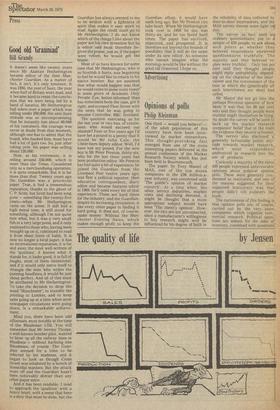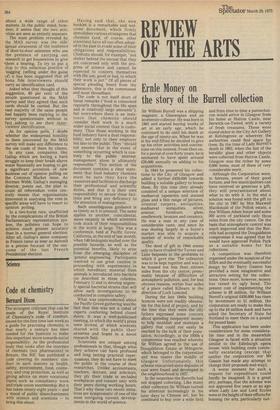Advertising
Opinions of polls
Philip Kleinman
One third — would you believe? — of the adult population of this country have now been interviewed by market researchers. This thought-provoking fact emerged from one of the more interesting papers delivered at the annual conference of the Market Research Society which has just been held in Bournemouth.
The paper, by Tony Mastel of MAS, one of the top dozen companies in the £36 million-ayear industry, was concerned with 'The public's opinion of market research'. At a time when, like other service industries, market costs and declining demand, it might be thought that a more appropriate subject would have been The client's opinion'. However, the two are not unconnected, since a manufacturer's willingness to buy research might well be influenced by his degree of faith in the reliability of data collected by door-to-door interviewers, and the MAS survey throws some light or" this.
The survey in fact used arm ordinary questionnaire, put to al sample of 430 people, to ask about, such points as whether they. believed respondents answered
questionnaires truthfully. The majority said they believed replies were truthful. Only ten per cent said they thought people. might reply untruthfully, depending on the character of the interviewer and the convenience of the time at which she (practically all such interviewers are shes) had called.
Mr IVIastel did not go into the perhaps frivolous question of how likely it was that the 90 per cent who said they thought people were truthful might themselves be lying.
No doubt the survey will be used to back up the market research companies' belief that in the main the evidence they receive is honest. The survey also disclosed a generally favourable public attitude towards market research„ which most respondents' understood as research into the use of products.
Curiously a majority of the same, 430 people expressed unfavourable opinions about political opinion polls. These were generally condemned as inaccurate, and one of the reasons suggested for their supposed inaccuracy was that people didn't tell pollsters the truth.
The curiousness of this finding is that opinion polls are, of course, carried out by the very same companies which organise commercial research. Political ques tions are indeed, for the sake of economy, combined with questions about a wide range of other matters. In the public mind, however, it seems that the two activities are seen as entirely separate.
The main problem revealed by the MAS survey was the side-. spread awareness of the existence of door-to-door salesmen who use the pretence of carrying out research to get housewives to give ,them a hearing. To try to put a stop to this nefarious practice of `sugging' (selling under the guise of) it has been suggested that all bona fide interviewers should carry an identification card.
Asked what they thought of this suggestion, 80 per cent of the people questioned in the MAS survey said they agreed that such cards should be carried. But the vast majority of the same people had happily been replying to the survey questionnaire without in fact asking to see their interviewers' identification. _
As for opinion polls; I doubt whether the widespread hostility to them uncovered by the MAS survey will make any difference to the use made of them by clients.
In any case, companies like Gallup which are having a hard. struggle to keep their heads above water financially are hoping to get a significant accretion of new business out of opinion polling on the Common Market issue. As Norman Webb, Gallup's managing directdr, points out, the plan to count all referendum votes centrally means that organisations interested in analysing the vote in specific areas will have to resort to opinion polling.
In a two-horse race, unaffected by the complications of the British Parliamentary representation system, the pollsters can hope to achieve much greater accuracy' than in a normal general election. After all, Gallup's sister company in France came as near as dam mit to a precise forecast of the outcome of the last French Presidential election.



































 Previous page
Previous page